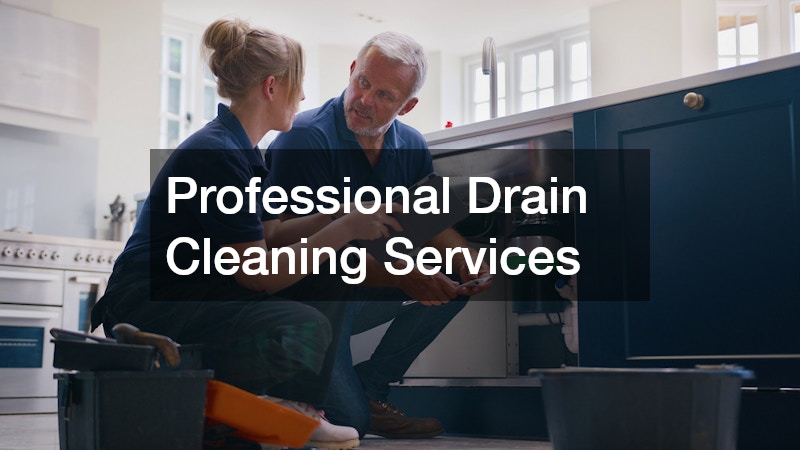Understanding why drains become clogged and how drain cleaning can address these issues is vital for maintaining a healthy plumbing system. This article explores the common causes of clogged drains, effective drain cleaning methods, and how you can prevent future blockages. Through awareness and timely intervention, homeowners can significantly reduce the incidence of plumbing issues and ensure a smoothly functioning household.
The Most Common Causes of Clogged Drains
Food Waste and Grease Build-Up
Clogged drains are often caused by food waste and grease build-up, which solidify over time, leading to blockages. Many people tend to underestimate the impact of disposing of scraps and oil down their sinks, which congeal and accumulate within pipes. This residue can block water flow and create a breeding ground for bacteria, further compounding the plumbing issues.
When food particles are washed down the drain, they may stick to oils and grease that have been previously disposed of, forming large, stubborn obstructions. These clogs require specific attention to break down, otherwise, they steadily worsen with the addition of more debris. Over time, these blockages can not only impair drain function but can lead to unpleasant odors and, in severe cases, cause pipes to burst due to pressure build-up.
Drain cleaning practices, such as regular flushing with hot water or the use of biodegradable de-greasers, can help dissolve these substances before they solidify. Implementing a routine cleaning schedule mitigates the accumulation of grease and debris, keeping the plumbing system running smoothly. Additional measures, such as the use of sink strainers to catch food particles, can substantially reduce the amount of waste entering the drain, preventing potential blockages.
Hair and Soap Scum Accumulation
Another prevalent cause of clogged drains is the accumulation of hair and soap scum, particularly in bathroom plumbing. Hair strands, when combined with soap residue, can form a sticky mass that clings to pipe walls, leading to slow drainage or complete blockages. These issues are most commonly encountered in shower drains and frequently used sinks, where hair is regularly washed away with soap and water.
When shampoo, conditioner, and soap lather enter the plumbing system, they can leave behind residues that contribute to clog formation. Over time, these residues act like a binding agent for hair, creating larger and more resilient obstructions that are difficult to remove without targeted cleaning efforts. This accumulation not only impacts the efficiency of the plumbing system but can also lead to hygiene concerns due to standing water and bacterial growth.
How Regular Drain Cleaning Helps
Preventing Future Blockages
Routine drain cleaning is an essential preventative measure to ward off future plumbing issues and maintain efficient water flow. By keeping drains clear of clutter, you significantly decrease the risk of developing serious blockages. Regular maintenance allows homeowners to identify potential problems early, thereby avoiding costly repairs.
Without routine cleaning, minor buildups can escalate into severe obstructions that necessitate professional intervention. By regularly removing deposits such as hair, soap scum, and food waste, households can ensure that their plumbing systems operate at full capacity. Simple practices, like weekly boiling water flushes or monthly de-greasing, can prove highly effective in combating clogging tendencies.
Extending the Lifespan of Plumbing
Regular cleaning contributes significantly to extending the lifespan of a plumbing system by reducing wear and tear. Clean drains reduce the likelihood of material corrosion since blockages and stagnant water can lead to pipe deterioration. A well-maintained plumbing system is more resilient to damage and will reliably serve a household for many more years.
Clogs create a buildup of pressure within pipes, risking cracks or even bursts that are not only damaging but also expensive to repair. By addressing small blockages early through routine cleaning, the strain on pipes is minimized, thereby preventing material fatigue. This proactive approach reduces the necessity for frequent overhauls and replacements of plumbing components.
Methods That Are Effective for Drain Cleaning
DIY Methods and Tools
Homeowners have a wide array of DIY methods and tools at their disposal to tackle minor drain clogs effectively. Simple tools such as plungers and drain snakes can provide quick relief from obstructions and restore normal water flow. In addition, household remedies like baking soda and vinegar offer a natural way of dissolving minor residue buildup.
Plungers work on the principle of creating suction, helping to dislodge obstacles lodged in the pipe. Drain snakes, on the other hand, involve inserting a flexible metal coil into the drain, which grips onto clogs, allowing for their removal. Chemical-free solutions, like a combination of baking soda and vinegar, offer an eco-friendly alternative by creating a fizzy reaction that can break down light grease and debris.
Professional Drain Cleaning Services
When DIY methods are inadequate, engaging the services of professional drain cleaners is a prudent choice. Professional cleaning not only ensures comprehensive removal of stubborn clogs, but also provides insights into the overall health of a plumbing system. These experts utilize advanced techniques and equipment, such as hydro-jetting, that are beyond the scope of typical household tools.
Hydro-jetting involves using high-pressure water streams to clear and clean interior pipe surfaces, which is especially effective for dislodging grease, scale, and other hard-to-remove deposits. Professionals are also equipped to perform inspections using specialized cameras to identify hidden issues within a plumbing system. This thorough approach mitigates unforeseen blockages, reducing the risk of plumbing emergencies and costly repairs.
By recognizing common causes of drain clogs and applying effective cleaning methods, you can ensure a smoothly functioning plumbing system. Regular maintenance and timely interventions can prevent costly repairs and enhance the efficiency of your household drains. Implementing preventative measures and seeking professional assistance when necessary will uphold a robust and enduring plumbing infrastructure.




